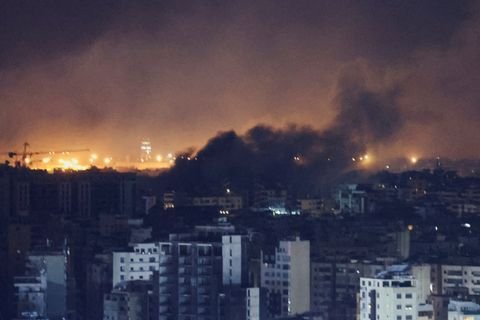Lebanon's Govt-Army Response
The Lebanese government, led by Prime Minister Najib Mikati, has been grappling with the consequences of Israel's military operations against Hezbollah. Despite its official stance of neutrality, the government has been criticized for its perceived weakness and inability to effectively respond to the crisis.

https://newshedline643.blogspot.com/2024/10/blog-post_6.html
In a televised address, Mikati acknowledged the gravity of the situation and pledged to implement UN Security Council Resolution 1701, which calls for the withdrawal of non-state armed actors from southern Lebanon and the deployment of Lebanese armed forces in the region. He also expressed his government's readiness to send troops to the area and carry out their full duties.
However, the government's efforts have been hindered by internal divisions and sectarian politics. The Hezbollah-dominated Shia bloc has been at odds with the government over its response to the crisis, with some ministers resigning in protest. The Sunni-led March 14 alliance, which has traditionally been opposed to Hezbollah, has also criticized the government's handling of the situation.
Lebanese Army's Role
The Lebanese Army, which has historically stayed on the sidelines of major conflicts with Israel, has been facing internal divisions and fears of civil war. Some army units have reportedly refused to deploy to the south, citing concerns about being drawn into the conflict and potentially facing Israeli fire.
Despite these challenges, the Lebanese Army has attempted to maintain a presence in the affected areas. According to reports, some army units have been deployed to the border regions, although their effectiveness has been limited by a lack of resources and equipment.
The army's commander, General Joseph Aoun, has called for calm and urged citizens to cooperate with the military. However, his efforts have been undermined by the government's inability to provide adequate support and resources.
International Mediation Efforts
Several international actors have attempted to mediate a ceasefire and de-escalate the situation. The United States has proposed a three-step plan, which includes the withdrawal of non-state armed actors from southern Lebanon, the deployment of Lebanese armed forces, and a development plan for the region.
France has also presented a proposal, which outlines a 10-day process of de-escalation and calls for Hezbollah to withdraw its fighters to a distance of about six miles from the border. However, these efforts have been met with skepticism by both Israel and Hezbollah, which have accused each other of violating ceasefire agreements.
Hezbollah's Response
Hezbollah, led by Secretary-General Hassan Nasrallah, has vowed to continue fighting against Israel, citing its right to defend Lebanon and its people. The group has launched numerous rocket attacks against Israeli targets, including civilian areas, and has claimed responsibility for several attacks on Israeli military positions.
Hezbollah has also accused Israel of committing war crimes and targeting civilian infrastructure, including hospitals and schools. The group has called on the international community to condemn Israel's actions and pressure it to cease its military operations.
Impact on Lebanese Civilians
The conflict has had a devastating impact on Lebanese civilians, with thousands displaced and hundreds killed or injured. The country's infrastructure, including hospitals, schools, and roads, has been severely damaged.
The economic situation has also deteriorated, with the Lebanese pound plummeting in value and food and medicine shortages reported. The country's already fragile healthcare system has been overwhelmed, with many hospitals struggling to provide adequate care to the wounded.
Conclusion
As Israel continues to attack Lebanon to fight Hezbollah, the Lebanese government and army have been unable to effectively respond to the crisis. Internal divisions, sectarian politics, and a lack of resources have hindered their efforts, while international mediation attempts have been met with skepticism.
Hezbollah has vowed to continue fighting, citing its right to defend Lebanon and its people. The conflict has had a devastating impact on Lebanese civilians, with thousands displaced and hundreds killed or injured.
Ultimately, a lasting solution to the crisis will require a comprehensive and inclusive approach, involving all stakeholders, including the Lebanese government, Hezbollah, and the international community. Until then, the people of Lebanon will continue to suffer the consequences of this devastating conflict.